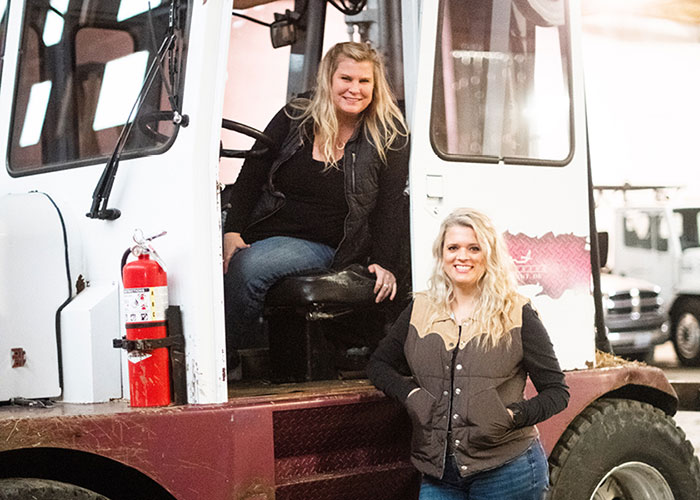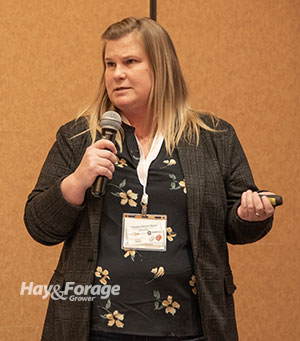Two women, eight balers, and a lot of trucks |
| By Mike Rankin, Managing Editor |
|
|
 Macey Wessels (sitting) and Shelly Boshart Davis own and operate Boshart Trucking in Tangent, Ore. They also manage two other vertically integrated businesses. (submitted photo) Oregon’s Willamette Valley marks the center of U.S. grass seed production. Once the grass seed is harvested, the remainder of the plant is left behind. This grass straw was once treated as a waste product, either burned in the field or removed and destroyed. Those days are over. Now, baled grass straw is a valued commodity for export. Two women who own or manage three vertically integrated businesses that depend on the grass straw industry are Macey Wessels and Shelly Boshart Davis. Wessels recently spoke at Symposium 2023, which is hosted by the Midwest Forage Association and Wisconsin Custom Operators.  Macey Wessels said their businesses value hard work, relationships, and community involvement. Both women came from family farms when they first met at the Oregon State Capitol while stumping for agricultural interests. They quickly became friends. “We are complete opposites,” Wessels said. “Shelly hates management and conflict but loves sales. I enjoy managing people. We talked about going into business together but didn’t know exactly what that would look like.” After exploring several business models, Boshart Davis suggested the two women buy her family’s trucking and straw-baling business, which was owned by her parents, Stan and Lori, in Tangent, Ore. That transaction became a reality in 2018, and the two friends now have a financial or managing interest in three field-to-end user businesses. Soon after buying Boshart Trucking, Boshart Davis successfully won a seat in Oregon’s House of Representatives. Boshart Trucking, which was started in 1983 with two semitrucks, now has a fleet of 35. The entity also does straw baling and employs 25 year-round workers along with 35 seasonal employees (mostly teenagers) during the summer harvest. In addition to straw, the company’s trucks haul many other agricultural and nonagricultural goods throughout the year. BOSSCO Trading LLC was formed in 1999 as the marketing arm of the businesses after the brokerage that Boshart Trucking sold straw to went bankrupt. At that time, Boshart Davis went to Japan and Korea to create a market for their grass straw. BOSSCO Trading LLC is managed by Boshart Davis but is still owned by her parents. It employs two full-time workers who are responsible for export sales and customer service. Pressco LLC, formed in 2003, was the final piece to the puzzle that completed the loop of field to end user. It is still owned by Boshart Davis’ parents but managed by Wessels. The bale-pressing facility does custom pressing and has 10 to 12 full-time employees. Here, bales are sliced, compressed, bound, and shrink-wrapped into bundles for loading into export containers. Extreme baling Boshart Trucking bales 20,000 acres of grass straw from 40 different growers. They work in about a 150-mile radius, and this all has to be accomplished in a six-week period. “There are four baling crews with each consisting of two Krone balers, two rakes, and a bale stacker,” Wessels explained. “Each crew has an adult crew chief and five seasonal workers who operate the equipment. Dense bales are important for the press to operate correctly. Bales are at least 1,000 pounds, but the average is closer to 1,200 pounds.” The grass straw comes from fields where fescue, perennial ryegrass, annual ryegrass, or orchardgrass seed was harvested. Wessels said that they bale mostly during the day to ensure a dry product, and the crew chief constantly monitors bale moisture. Most fields produce about 2.5 tons per acre. Electronic logging devices (ELDs) are in all of Boshart Trucking’s trucks, bale squeezes, and a lot of the harvest equipment. This makes it possible to see where equipment is located at all times from the company’s offices. “We operate with complete transparency for our growers,” Wessels said. “After harvest, we provide them with a yield report and they are paid over the course of 12 months with price adjustments made based on the export straw market, which varies throughout the year. We both share in up markets and down markets.” The grass straw market is in Japan and Korea. “This is not a hay product,” Wessels explained. “We compete against wheat and rice straw. The product is simply used in livestock rations to add fiber.” Boshart Trucking moves about 50 containers per week to the port for export for BOSSCO Trading. “We feel we have an advantage in traceability,” Wessels said. “We can trace any of our straw back from Korea and Japan to the field that it came from. Having control of the entire process has led to us having a really stable customer base.” Wessels acknowledged that a lot of their business success depends on things out of their control. “Whether it’s a good grass straw year or not, we still have to cover 20,000 acres,” she said. “We also are directly impacted by the strength of the U.S. dollar and international shipping bottlenecks.” Employees make the difference “Employees are our lifeblood,” Wessels asserted. “We invest in our employees through extensive training and education, and we allow them to be involved in the community. We try to work around their schedules as much as possible. I would do anything for my employees, and I’d like to think they’d do anything for me.” Wessels and Boshart Davis feel it is important to invest their time and effort in youth workers, although it’s not always easy doing so. A lot of their seasonal labor are only 14 to 19 years old. “We train them and require them to take safety classes for driving tractors and equipment,” Wessels said. “At 14 years old, they get their first job interview. Most of them don’t come off the farm. They quickly learn that one job impacts the next. A bad job of raking impacts the baler, a bad job of baling impacts the stacker, and a bad job of stacking impacts the squeeze operator who loads the trucks.” Wessels said that hiring new and maintaining skilled full-time employees remains a challenge. “We hire people who we like and will fit into our environment,” she said. “We then train them ourselves for two years and eventually pay for their commercial driving license (CDL) and schooling.” In concluding, Wessels said, “There is plenty of opportunity in agriculture for people who are willing to work hard and think outside the box.” For her and Boshart Davis, that thought process is grounded in life experiences. |
